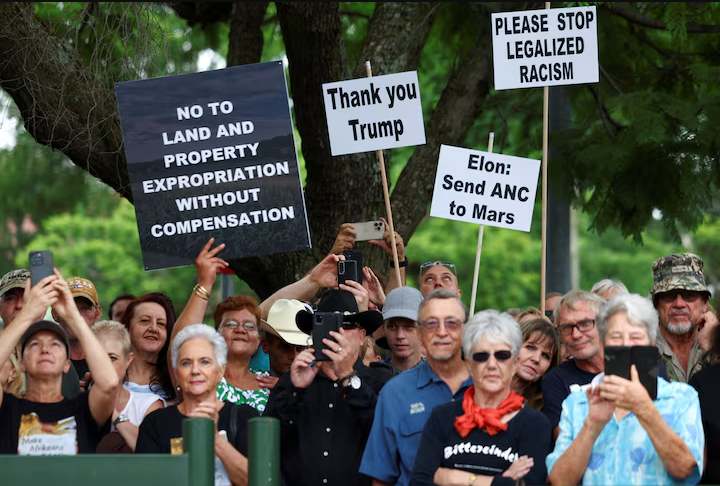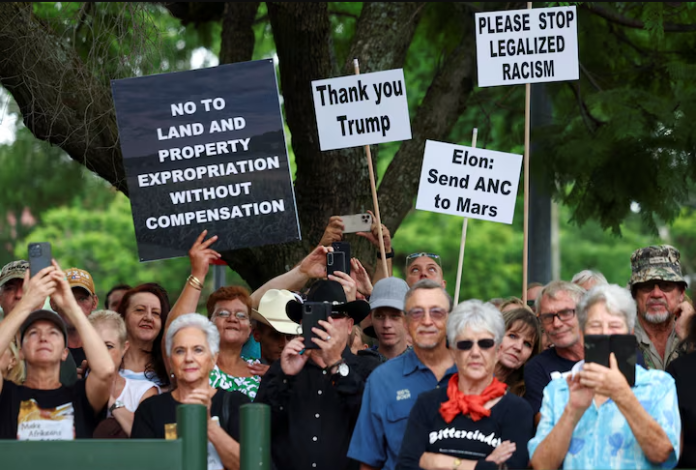In a move sparking both praise and criticism, the Trump administration has welcomed 59 white South Africans, granting them refugee status in the U.S. amid claims of racial persecution. The refugees, mostly descendants of Dutch settlers known as Afrikaners, have been granted priority status, something that has ignited debate on both sides of the political spectrum.
In a statement, President Donald Trump claimed that the Afrikaners were victims of “genocide” in South Africa, citing what he believes to be widespread violence against them. However, these claims have been disputed by South African officials and other critics, who argue that there is no evidence to support the allegations of systemic violence or persecution against the white minority in South Africa.
The U.S. has notably blocked the entry of refugees from other countries, particularly non-white refugees from Africa. Trump’s administration, however, is now making exceptions for the Afrikaners, signaling a shift in refugee policy that has raised eyebrows. While some argue that the move is politically motivated, others see it as an attempt to assist a group they believe is unfairly targeted in South Africa.
During a press conference, Trump reaffirmed that the race of the refugees did not matter to him personally, though he did reiterate his belief that Afrikaners were being “killed” in their homeland. These comments echo previous claims from right-wing groups who have long argued that white South Africans face unfair treatment.
Critics of the decision, including many in South Africa, have dismissed the idea of a “white genocide” as exaggerated and unsubstantiated. South African President Cyril Ramaphosa described the claims as misplaced, insisting that the U.S. government had misunderstood the situation. He emphasized that the government’s land expropriation policy, which allows for state-owned land to be redistributed to address the legacy of apartheid, was not an attack on white South Africans but rather a necessary step toward correcting historic injustices.
The land issue has been a point of contention for many Afrikaners. The new law makes it easier for the South African government to expropriate land in the public interest, but there have been no large-scale seizures so far. Still, the fear of losing their land has prompted some Afrikaner families to seek refuge abroad. One such refugee, Charl Kleinhaus, 46, arrived in the U.S. this week with his family. He claims that his life was threatened, and his property was targeted by groups opposed to his ownership. However, his allegations have yet to be independently verified.
Despite the controversy, U.S. officials, including Deputy Secretary of State Christopher Landau, have defended the resettlement decision. Landau drew parallels between the Afrikaners’ situation and that of his own Jewish father, who fled Europe during the rise of the Nazis.

He stated that many of the refugees were farmers who had worked the land for generations, now facing expropriation and violence due to the changing political landscape in South Africa.
While the Trump administration continues to champion the cause of the Afrikaners, the move has sparked backlash. The Episcopal Church, one of the U.S.’s largest religious organizations, announced that it would no longer collaborate with the federal government on refugee resettlement, citing frustration with the preferential treatment given to one group of refugees over others.
Furthermore, U.S. Senator Jeanne Shaheen criticized the move as politically driven, claiming it was an attempt to “rewrite history.” Meanwhile, South African leaders have continued to push back, stating that the U.S. is misjudging the situation and that the country’s leadership will seek to correct the narrative.
As the debate continues, more Afrikaner refugees are expected to arrive in the U.S. in the coming months. The move is likely to remain a contentious issue, with critics pointing out the apparent double standard in refugee policy and the broader implications for U.S.-South Africa relations.



